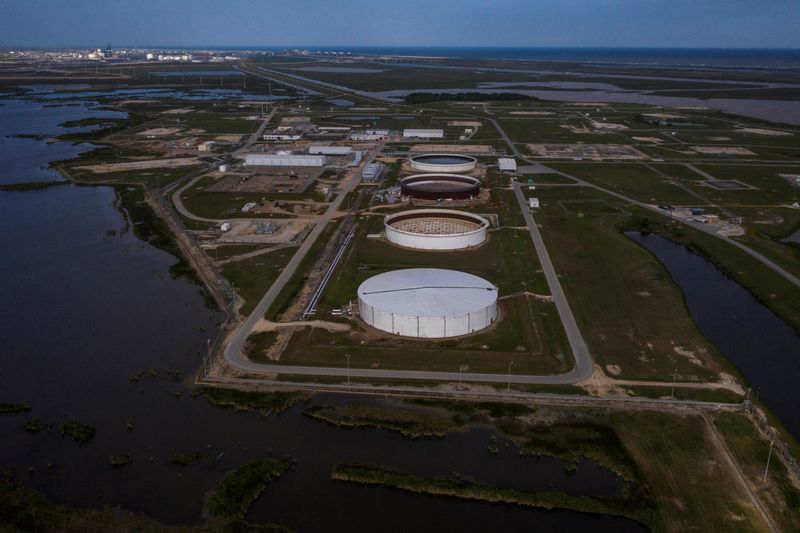By Scott DiSavino
NEW YORK (Reuters) -Oil prices climbed about 3% to a one-week high on Monday, buoyed by hopes of rising fuel demand this summer despite a stronger U.S. dollar and expectations the U.S. Federal Reserve will leave interest rates higher for longer.
The Fed hiked interest rates aggressively in 2022 and 2023 to tame a surge in inflation. Those higher rates have boosted borrowing costs for consumers and businesses, which can slow economic growth and reduce demand for oil.
Similarly, a stronger U.S. dollar can reduce demand for oil by making dollar-denominated commodities like oil more expensive for holders of other currencies.
Brent futures rose $2.01, or 2.5%, to settle at $81.63 a barrel, while U.S. West Texas Intermediate (WTI) crude rose $2.21, or 2.9%, to settle at $77.74.
That was the highest close for both crude benchmarks since May 30.
"Futures are higher as expectations of summer demand are supportive of prices ... despite the broader macro landscape remaining less optimistic than weeks previous," analysts at energy consulting firm Gelber and Associates said in a note.
Goldman Sachs analysts said they expect Brent to rise to $86 a barrel in the third quarter, noting in a report that solid summer transport demand will push the oil market into a third-quarter deficit of 1.3 million barrels per day (bpd).
The U.S. dollar, meanwhile, rose to a four-week high against a basket of other currencies as the euro fell sharply due to political uncertainty in Europe after gains by far-right parties in voting for the European Parliament prompted a bruised French President Emmanuel Macron to call a snap national election.
Oil last week posted a third straight weekly loss on concerns that a plan to unwind some production cuts by the Organization of the Petroleum Exporting Countries (OPEC) and its allies, known collectively as OPEC+, from October will add to rising supply.
Despite the OPEC+ cuts, oil inventories have risen. U.S. crude stocks increased in the latest week, as did gasoline stocks. Energy consultancy FGE also expects oil to rally, with prices reaching the mid-$80s into the third quarter.
"We continue to expect the market to firm up," FGE said. "But it will likely need a convincing signal of tightening from preliminary inventory data."
LOOKING AHEAD
Investor attention now turns to the release of U.S. consumer price index data for May on Wednesday for hints on when the Fed may start reducing interest rates.
The market is also waiting for the conclusion of the Fed's two-day policy meeting on Wednesday, in which the central bank is overwhelmingly expected to hold interest rates steady.
Markets dialed back expectations for rate cuts by the Fed in September after stronger-than-expected jobs data on Friday, with pricing now reflecting a less-than-50% chance of a reduction. Expectations for a cut had risen as high as 69% last week.

Traders also trimmed their expectations for the amount of Fed easing this year, with pricing implying just one cut versus two prior to the payrolls data, according to data from financial firm LSEG.
The market is also waiting for monthly oil supply and demand data from the U.S. Energy Information Administration (EIA) and OPEC on Tuesday and the International Energy Agency (IEA) on Wednesday.